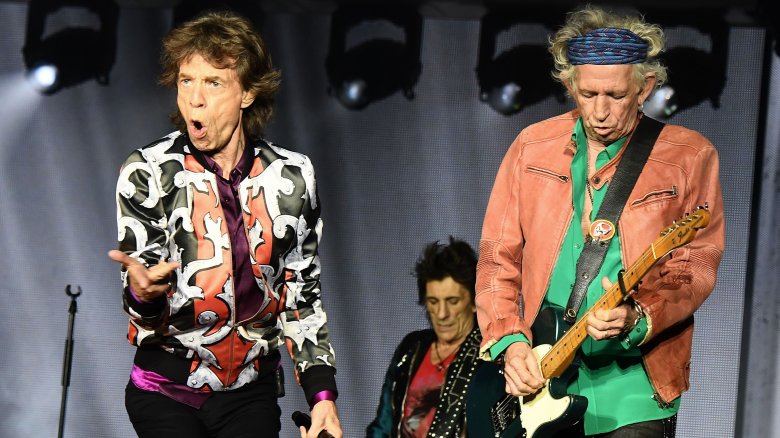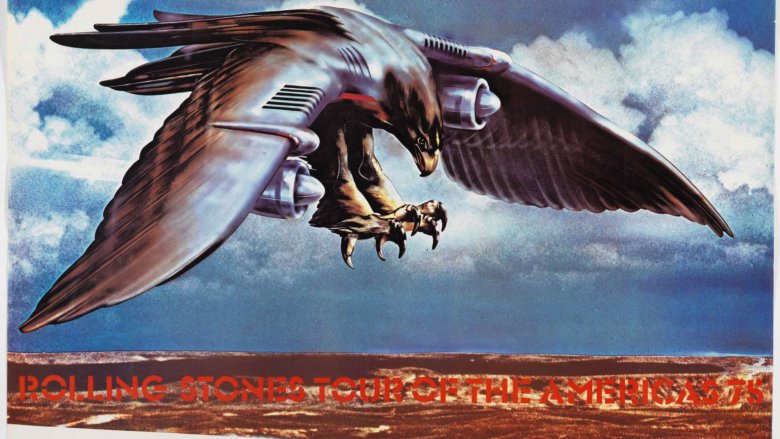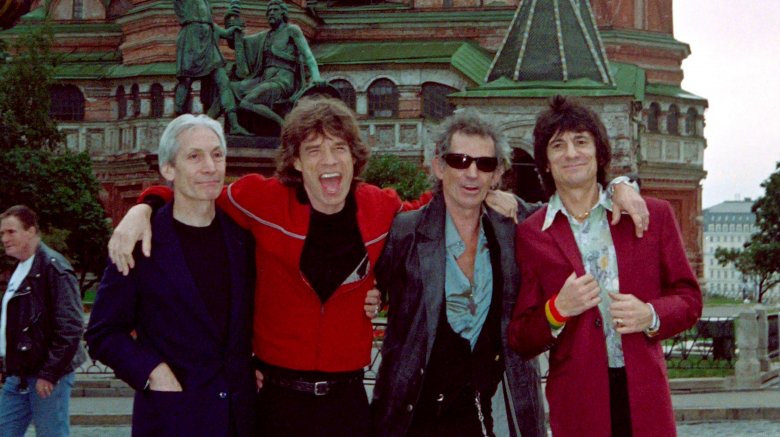The Untold Truth Of The Rolling Stones
If there's a band that needs no introduction, it's the Rolling Stones.
"(I Can't Get No) Satisfaction." "Sympathy for the Devil." "Paint it Black." "Gimme Shelter." "Brown Sugar." "Get Off My Cloud."
The list goes on and on. Their songs didn't just define a snapshot of music history; they paid homage to the blues and jazz musicians of yesteryear and massively influenced a staggering number of the artists who came after them. They may have started out during the infamous British Invasion standing alongside groups like the Beatles, but it didn't take long for it to become very, very clear that they weren't your grandma's tea-and-crumpets Brits.
It's tough to stress just how important the Stones have been (and impossible to over-stress it), but in spite of all that success and notoriety, there are still some things out there that just aren't common knowledge. Is it because all that partying and hard living sort of made history a little hazy? You be the judge.
It's only Snap, Crackle, and Pop ... and I like it
Remember "Mad Men"? There was one episode of the hugely popular TV show that seemed so implausible it was almost ridiculous ... but it was absolutely true, as much as Mick Jagger and Keith Richards might want everyone to forget about it.
In the episode, Don Draper tries to score an agreement with the Stones to record a jingle for Heinz baked beans. Unlikely? No, he says, they've done it before. A few years ago, for cereal.
Cynical viewers might scoff, but that part is true. The cereal was Rice Krispies, and because the internet never forgets anything — ever — the curious can still check it out. Real or fake? Snopes got confirmation from Kellogg's that it was, indeed, the Stones singing that chirpy little jingle. It was even written by Brian Jones and aired only in the United Kingdom about a year before they got huge with the release of "Satisfaction."
A rolling stone gathers no moss
If the Rolling Stones had opted to stick with their original name and stay The Blues Boys, would music lovers still be as impressed?
According to Radio X, the group didn't even have their name until they were offered a spot performing at London's Marquee Club. It was their break, and Brian Jones was talking to Jazz News when he needed a name — fast. Fortunately, there was a Muddy Waters album sitting nearby. Track Five: "Rollin' Stone." They stuck with that for the first performance (which Jones did as Elmo Lewis), but decided to add a "g" and an "s" and the rest is history.
So what about that infamous logo? There's a rumor it's based on Mick Jagger's distinctive pout, but that's just part of the story. What really happened, says Radio X, is that the Stones called Jon Pasche, an art student from the Royal College of Art, and commissioned him to design a logo for them. Jagger had some inspiration to offer him: the Hindu goddess Kali. He'd found a drawing of her with a very, very pointed tongue, and Pasche himself later said, "A lot of people ask me if it was based on Mick Jagger's lips — and I have to say it wasn't, initially. But it might have been something that was unconscious and also really dovetailed into the basic idea of the design."
He's just Like a Rolling Stone
Anyone who's been to a Stones concert post-1994 might have noticed the new guy filling Bill Wyman's shoes on bass. His name is Darryl Jones, but weirdly he's never in official photos of the group. He also hasn't actually been credited with being a "real" Rolling Stone, even though he's played on pretty much every song, album, and tour since he joined.
And it's a big deal, one that means he's hired on and paid like other backup musicians instead of being entitled to a full cut of the band's profits. He's told the BBC, "I have been a sideman for more than 30 years now. ... And I would not be being completely honest if I said that it would not be wonderful, it would not be amazing, to be considered and, you know, jump into this organization as a full member. But that is not a decision I am in a position to make."
Jones isn't the only one who's been in that position. Ronnie Wood (right) was a side guy for more than 10 years before he was made an official member of the group, and remember Ian Stewart? The keyboardist who was in the group for more than 25 years, starting in the '60s? If not, that's probably because manager Andrew Loog Oldham pushed him out of all the promo materials for the band because he didn't look the part.
Brian Jones: Till the Next Goodbye
Few rock 'n' roll stories are more tragic than the story of Brian Jones. The rhythm guitarist for the Stones from the beginning, Rolling Stone was reporting on his untimely death in 1969, just seven years after the group was formed. Jones had been pulled from the bottom of his swimming pool, dead by the time paramedics got there.
The official ruling was "misadventure," and there were all kinds of reports of sleeping pills, alcohol, and drugs all playing a part. Sadly, no one was truly surprised, as he'd been fired from the group just a month earlier on the heels of an arrest over drug charges. According to Rolling Stone, Jones had floated away from the group post-"Beggar's Banquet" and announced he would be leaving not long after.
Was his death an open-and-shut case? Just another story of the rock 'n' roll lifestyle taking a brilliant musician too soon? Maybe, maybe not. In 2009, the Guardian reported that more than 600 new documents pertaining to Jones' death had been handed over to police. That sparked rumors all over again, whispered speculation that he hadn't died accidentally, but that he had been murdered. The story most frequently repeated by friends was that he had actually been killed by a builder working on his home (a home that, incidentally, had previously been owned by Winnie the Pooh creator A.A. Milne). Will the truth ever come out?
Street Fighting Men
Life with the Stones hasn't always been smooth sailing, especially when Keith Richards released his memoir, "Life." It's no wonder not everyone was thrilled with the contents. It included anecdotes like his real opinions on Mick Jagger's 2001 album, "Goddess in the Doorway,: a title Richards suggested should be changed to "Dogs**t in the Doorway." Oof.
It's not the first time Richards has declined to hold his tongue for the sake of civility, and according to the Washington Post, it got so bad around 1985 that he started calling the period "World War III." At the heart of that argument was Jagger's first solo album trumping the Stones' '"Dirty Work" on the scale of importance, which didn't sit well with the others. It was so bad, in fact, that Richards has said he thought it could be a "death sentence" for the group.
They made amends and got back together for "Steel Wheels," but Rolling Stone says the atmosphere was so acrimonious that the rest of the group began referring to Jagger as either "Her Majesty" or just "that b*tch Brenda" as a way of talking about him while he was standing right there. At the heart of the conflict, Richards has said, is that "he can't stop being Mick Jagger all the time."
Sweet Blind Angel
Part of the problem that comes with sifting through the Stones' history and trying to make sense of it all is that it's a little foggy. Take 1977. That was the year Rolling Stone says Keith Richards ended up getting a suspended sentence for a heroin conviction in Canada, and part of that sentence was to play a benefit concert for the blind.
It wasn't just a small, token affair, either. Around 10,000 people were in attendance (and in spite of Oshawa, Ontario, residents worrying their city was about to be pillaged and burned to the ground, everyone was Canadian-level polite), with 2,600 tickets reserved for blind concert-goers.
And how that came about is Stones-level strange. According to "The Rolling Stones: A Musical Biography," the band had befriended a blind woman named Rita Bedard, whom they met after she hitchhiked to all their shows (via Rolling Stone). Richards had volunteered to give her a ride himself, and she was so impressed by his thoughtfulness that after his arrest, she approached the judge and appealed for leniency — and suggested they perform the benefit concert in lieu of jail time. Sure, it sounds unlikely — and even the Stones' biographer expressed doubts it ever happened — but the concert was played, Richards didn't go to jail, and in 2015, he tweeted a picture of himself reunited with Bedard, his "Blind Angel from Toronto."
Mother's Little Helper ain't got nothin' on this stuff
Cocaine, heroin, LSD ... it's not just the Stones that are associated with some of the most hardcore drugs out there, it's all of the music industry. But Keith Richards elevates it into something that's not just a bad, dangerous, illegal hobby, it's almost supernatural with him. According to Forbes, his notoriety has earned him the top spot on NME's list of rock stars mostly likely to die for a decade running, and that's almost unthinkable. And yes, Richards had unprecedented access to some pretty potent stuff.
According to Richards (and his supplier), entire tours — particularly one in 1975 — were entirely fueled by a type of pharmaceutical-grade cocaine called Merck cocaine. It's called Merck cocaine because the German company Merck was once a major supplier, and it's been around for so long that Sigmund Freud also extolled the virtues of the same stuff, officially used as a local anesthetic.
All drug runs have to come to an end sometime, though, and according to The New Yorker, that particular high came to a screeching halt in Fordyce, Arkansas. The Rolling Stones were busted with a car full of the stuff, and somehow, talked their way out of drug charges.
Play With Fire ... literally
Everyone can agree that the 1970s were a different time. They were also the time that Hugh Hefner was splitting his time between mansions in Los Angeles and Chicago, and it was the Stones who nearly burned down that Chicago location.
Keith Richards told the story in his biography, "Life." He said it was 1972 when they were invited to hang there, and he and Bobby Keys thought it was a great idea to shut themselves in a bathroom and start doing drugs. Keys eventually realized it was getting smoky, and the waiters and security put the fire out with buckets of water.
Keys passed away in 2014, and according to Rolling Stone, every Stones fan knows his work — that's him playing the saxophone on "Brown Sugar" and throughout "Exile on Main St." But he wasn't with them too incredibly long — the year after he and Richards almost burned down the Playboy Mansion, Richards went looking for him after he missed a tour commitment. He found him — in a bathtub filled with Dom Perignon, along with a French girl and a cigar. They each told each other where to go, and go their separate ways they did.
Anybody seen Bill Wyman's baby?
Everyone has done things they prefer don't get out, and according to founding Stone Bill Wyman, his "skeleton in the cupboard" is his one-time wife Mandy Smith. They were married when he was 49 and she was 18, but it's not the age gap that was the problem. The problem was that by that time, they had been together for five years.
The relationship ended badly in 1993. Twenty years later — by which time Wyman had a 14-year-old daughter of his own — he addressed Smith's statement that the first time they had "relations" was when she was just 14. "It was very emotional and special at the time," he said. "It wasn't how it was reported to be, and it was the only time it ever happened in my life. A lot of people understood, but a lot didn't, and the media certainly didn't."
That's bad. It gets worse. Wyman had a son from his first marriage (which lasted from 1959 to 1969), and he's described that marriage as doomed from the start. He hooked up with the young Smith well after his divorce ... at the same time that his son started hooking up with Smith's mother. When the Guardian asked him in 2006 if he saw his one-time child bride anymore, he replied, "Nope. Never. It was an error I made. ... I had to get rid of everything and turn over a new leaf and start again." That included his career with the Stones.
All the nasty subjects in one go
"God knows what I'm on about on that song. It's such a mishmash. All the nasty subjects in one go." That's what Mick Jagger had to say about "Brown Sugar" in 1995 when Rolling Stone asked him just what was up with what was one of their most controversial songs.
According to Jagger, he wrote "Brown Sugar" while he was in Australia, working on the movie "Ned Kelly" and attempting to rehabilitate himself after a hand injury. He was surprised it was as successful as it was, and added, "I would never write that song now. ... I would probably censor myself. I'd think, 'Oh God, I can't. I've got to stop. I can't just write raw like that.'"
There are plenty of fascinating tidbits in the song's history. It was written about a strange combination of sex, slavery, and interracial relationships, which makes it even stranger that it was recorded in Alabama — a state that, AV Club notes, had laws on the books making interracial marriage illegal until 2000. The first time it was played in public was just as controversial: It debuted at their ill-fated free concert at Altamont.
According to Vulture, it's not just the listeners who think the lyrics are a little bit too edgy and racist and misogynistic. Jagger regularly changes them when it's performed in concert, and both he and Keith Richards distance themselves from the content of their own song.
The most tragic song of all
"Gimme Shelter" is incredible, in no small part because of the addition of a powerful female vocalist. That's soul singer Merry Clayton, who had already worked with names like Elvis Presley long before the Stones gave her a call. It was a phone call that was responsible for one of the most chilling performances given on a Stones' album, but it also led to tragedy.
According to Clayton, it was nearly midnight when the phone rang. When producer Jack Nitzsche asked her to come do a recording, her husband intervened. He said no, at first — she was very, very pregnant — but Clayton eventually went. She had to sit down to sing, did only three takes, and was done.
Not long after she left the studio, she suffered a miscarriage possibly brought on by the stress and intensity of her late-night performance. She would later say that for years, she was completely unable to listen to the song because of the memories.
And the Stones have never forgotten. In 2015, Clayton was awarded the Clark & Gwen Terry Award for Courage through the Jazz Foundation of America, and Keith Richards was on hand to perform "Gimme Shelter" live. Clayton herself, the New York Times said, was accepting the award via a taped segment from her L.A. home — she was only slowly returning to the public eye after being in a tragic car accident and losing both her legs.
Get Off My Cloud. No, really — go away
Truman Capote might be one of the giants of the literary world, but when he was hired by Rolling Stone to do a story on the giants of the rock world, it didn't go well.
Publicist Carol Klenfner spoke to the Huffington Post about their 1972 tour and called it a convergence between "rock 'n' roll and cultural society" that just didn't work out. Mick Jagger was fine with it, but Keith Richards was another story. "He basically hated what Capote stood for," she said, and not only did he just start calling him Truby, but he tormented and threatened his way through the tour. At one point, he doused Capote's hotel door with ketchup and threatened to beat him senseless. Capote didn't come out, and he didn't write the story he was hired to, either. He did, however, sit down with Andy Warhol after it was over and share some thoughts on the experience and explain why the story never got written.
"Oh, I enjoyed it. I just didn't want to write about it because it didn't interest me creatively. You know? But I enjoyed it as an experience. I thought it was amusing."
Charlie Watts: Miss you
On August 24, 2021, the Rolling Stones shared some heartbreaking news in the form of a statement that read, in part: "It is with immense sadness that we announce the death of our beloved Charlie Watts. He passed away peacefully in a London hospital earlier today surrounded by his family."
Details — amid a request for privacy — were sparse, but Variety noted that his passing came not long after he pulled out of a rescheduled, post-COVID concert tour. He was replaced by Steve Jordan, and Watts explained, "For once my timing has been a little off. I am working hard to get fully fit but I have today accepted on the advice of the experts that this will take a while."
Watts had undergone an unspecified medical procedure, and while doctors had said it was "completely successful," a subsequent recovery period was necessary.
He last performed with the group at an August 2019 concert in Miami and during a pandemic live-stream in 2020. He is survived by his wife, Shirley — who he married in 1964 — and their daughter, Serafina. He was 80 years old and had been a member of the Stones for 58 of those years. Keith Richards once summed up what it was like to work with him: "... Charlie Watts is one of the best hidden assets I've had ... I can throw him ideas and I never have to worry about the beat ... It's a blessing."
